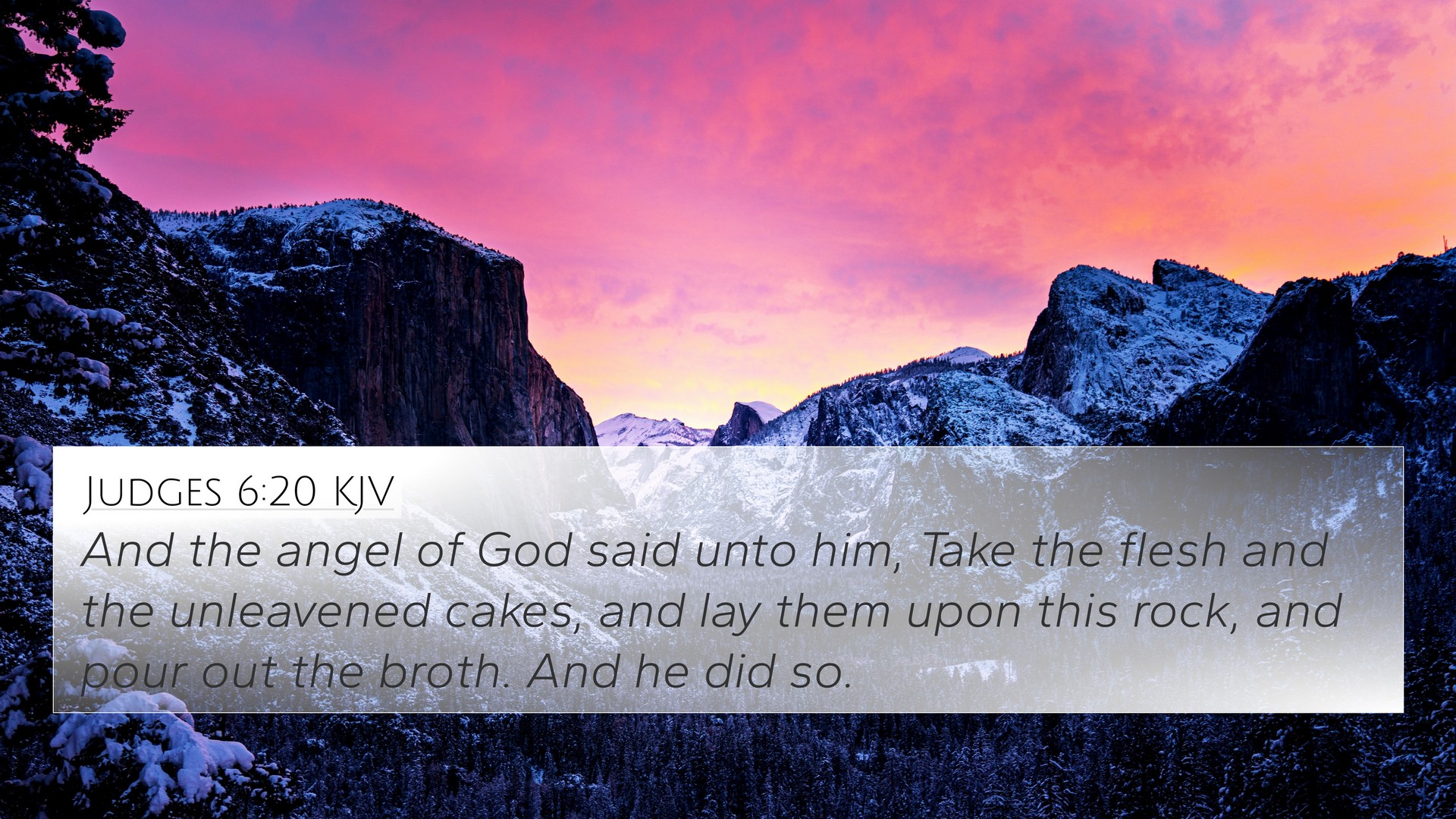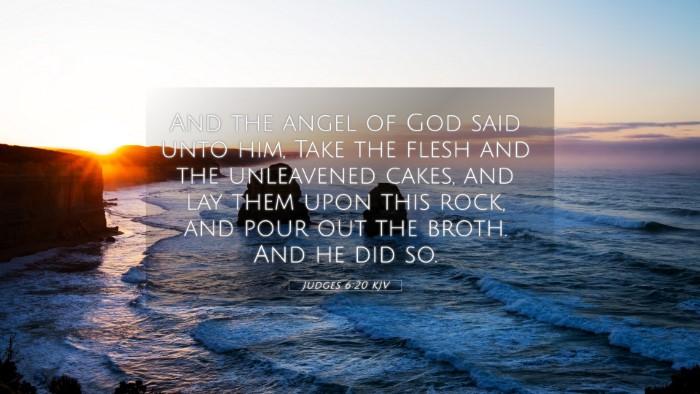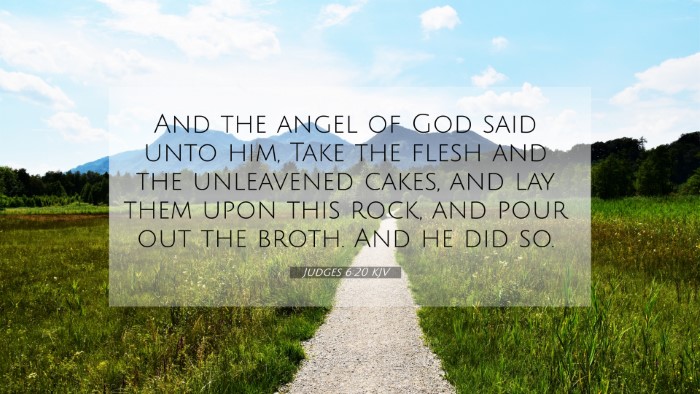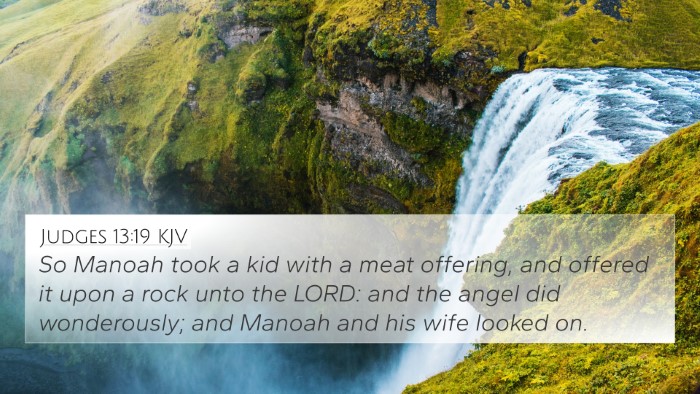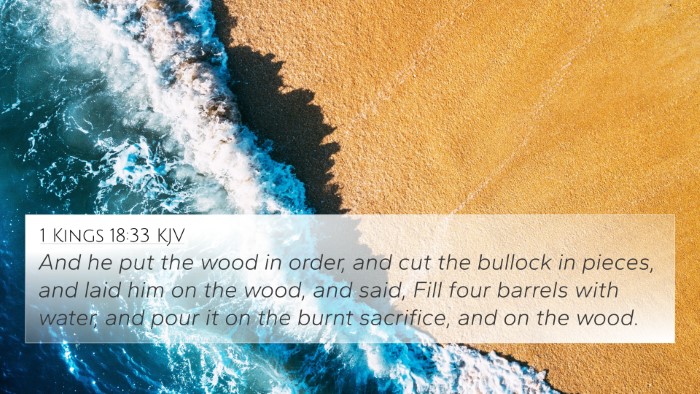Understanding Judges 6:20
Verse Context: Judges 6:20 states, "And the angel of God said unto him, Take the flesh and the unleavened cakes, and lay them upon this rock, and pour out the broth. And he did so." This verse is part of Gideon's encounter with the angel, marking a significant moment in his calling and commissioning.
Meaning of Judges 6:20
Judges 6:20 is a profound moment in Scripture where God interacts with Gideon during a time of despair and oppression. The angel of the Lord instructs Gideon on how to prepare an offering, highlighting the divine guidance in his mission.
Insights from Public Domain Commentaries
-
Matthew Henry's Commentary: Henry emphasizes that the Lord's commands to Gideon reflect God's specific guidance. The call to lay the sacrifice on a rock signifies God's desire for dedication and a holy offering, revealing the importance of sacrifice in service to God.
-
Adam Clarke's Commentary: Clarke notes that the unleavened cakes represent purity and the proper way to honor God in worship. He explains that the act of pouring out the broth symbolizes the completeness of the offering, reflecting a heart devoted to God's service.
-
Albert Barnes' Notes: Barnes elucidates that this moment was a test of faith for Gideon. The instructions given were not mere rituals but served to establish Gideon’s readiness to follow God’s plan. The physical act of sacrifice illustrates a spiritual commitment.
Thematic Connections
This verse embodies themes of faith, obedience, and divine provision. It shows how God meets individuals in their doubts and calls them to significant roles. This moment lays the groundwork for understanding Gideon's later victories against the Midianites.
Cross-References Related to Judges 6:20
- Genesis 18:1-8: Abraham's hospitality reflects similar themes of offering and divine visitation.
- Exodus 12:8: The unleavened bread is significant in Jewish tradition, linking to the concept of purity.
- 1 Samuel 10:8: Sacrifices in serious matters, indicative of spiritual preparation.
- 1 Kings 18:33: The act of offering on a rock connects to Elijah's confrontation with the prophets of Baal.
- Romans 12:1: The New Testament reflection on offering oneself as a living sacrifice.
- Hebrews 11:32-34: Gideon's faith is recognized as part of the great cloud of witnesses.
- Matthew 5:23-24: The importance of reconciliation before offering, emphasizing the heart behind sacrifices.
Connecting Judges 6:20 to Larger Biblical Themes
Judges 6:20 is a pivotal moment not just personally for Gideon but also within the narrative of Israel's cyclical journey of sin and redemption. The cessation of oppression mirrors God's faithfulness in returning to the faithful.
Scriptural Dialogue and Inter-Connections
The connections between this verse and others enhance understanding through scriptural cross-referencing. They illuminate a thematic dialogue about sacrifice and divine calling, evidenced throughout the Bible. For example:
- Similarities with the sacrifices in Levitical law: showing that God desires heartfelt offerings.
- The call of Moses (Exodus 3): another divine calling initiated by God accompanied by miraculous signs to encourage faith.
- Gideon's doubt (Judges 6:15): contrasting his hesitation with the assurance he receives.
Conclusion
This passage encourages believers to recognize how God prepares and equips them for their purposes. The call to sacrifice and the authenticity of approaching God in worship are themes resonating throughout the Scriptures.
For those studying Bible verses that relate to each other, this verse demonstrates the rich tapestry of God's interactions with His people, linking together various themes and events throughout the Biblical narrative.
Tools for Bible Cross-Referencing
To deepen understanding of Bible verse connections, readers are encouraged to utilize Bible concordances and cross-reference guides. These tools can illuminate thematic Bible verse connections across the Old and New Testaments, enhancing Bible study with comprehensive Bible cross-reference materials.
